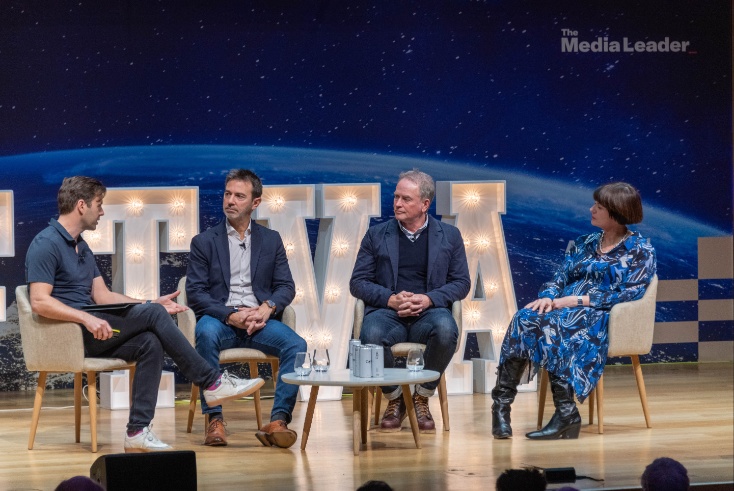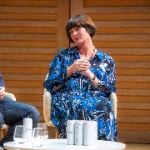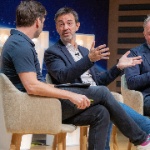TV commercial chiefs: Broadcasters should be seen as streamers, producers and platforms

What is the future of TV advertising in the UK?
At the Future of TV Advertising Global this month, the UK’s top three commercial chiefs sat down together for the first time to discuss whether TV has an image problem amongst buyers, the future of cross-platform measurement and changes in the ad market.
Brett Aumuller, managing director at Sky Media, Kelly Williams, managing director for commercial at ITV, and Veriça Djurdjevic, chief revenue officer at Channel 4, spoke to Adwanted Events chair Justin Lebbon.
Broadcasters are not just broadcasters any more
Earlier in the day, analyst Brian Wieser and other sessions had brought up the idea of TV now being seen by marketers as “old-fashioned” and “not sexy”.
Williams disagreed with this view, explaining he did not think ITV, Sky and Channel 4 should be solely seen as broadcasters.
“We get described as broadcasters, in fact we probably describe ourselves as broadcasters, but I don’t think we are broadcasters. We broadcast but we also stream — we stream on-demand and we stream live TV. We’re producers — we produce a tonne of content,” he said.
“The ITV Studios have the biggest show in the UK at the moment — a number one show on Netflix [Squid Game: The Challenge]. But we’re also platform owners and I think the number one thing we do is just brilliant content whether it’s drama, entertainment, or factual.”
 He highlighted that between the three TV players represented on stage, they show every major sport in the UK and fund professional independent and impartial journalism and news.
He highlighted that between the three TV players represented on stage, they show every major sport in the UK and fund professional independent and impartial journalism and news.
As far as TV advertising is concerned, Williams thought there had “never been a more exciting time” with ITV, Sky and Channel 4’s “massive” combined weekly reach of 42 million people.
Williams, Aumuller and Djurdjevic were not convinced that those outside of the TV world were aware of all of these benefits and nuances in TV advertising.
“You’ve got to take it back to the advertiser. Every single day in the UK we’re exposed to about five thousand advertising messages. If you want to stand out as an advertiser, you’ve got to be memorable,” Williams stated. “Advertising is a competition for memory and memory is all about emotion and that’s what we deliver.”
The viewers of 10 years’ time
Throughout the day several sessions expanded upon the idea of TV moving away from linear, but also that TV players should do more to go after digital adspend.
Around this Djurdjevic said: “Certainly all of us broadcasters are thinking very seriously about a more digital future. Importantly we also recognise though that linear is still a really important mainstay, it is hugely effective and it’s a massive driver of effectiveness. So, how you start combining the different aspects or various offerings is actually going to be a really critical thing.”
She added that TV “has got really stuck at the moment” in spending too long talking about plumbing and not enough time talking about the bigger picture around what marketers and agencies want to achieve.
Lebbon asked the panel if they were “on board” with digital partners, short-form content, and whether the financial arrangements benefitted them.
Aumuller said that Sky had news and sports groups on YouTube and while he would not reveal the commercial economics publicly, he said the broadcaster “would not do it otherwise”.
Williams admitted social was hard to monetise relative to ITV’s own platforms, but he thought they had to be there to promote their shows.
 Djurdjevic said: “For us, part of that activity be it through short-form through something like Channel 4.0 which is specifically short-form on YouTube, it is its own opportunity. But it is also those are our viewers of tomorrow and in 10 years’ time, so we have to use it to attract the viewers that we want to have in the future and also to make sure that our brands exist as the curators and providers of quality content online.”
Djurdjevic said: “For us, part of that activity be it through short-form through something like Channel 4.0 which is specifically short-form on YouTube, it is its own opportunity. But it is also those are our viewers of tomorrow and in 10 years’ time, so we have to use it to attract the viewers that we want to have in the future and also to make sure that our brands exist as the curators and providers of quality content online.”
We are not the competition
Referring to a presentation by ITV’s planning and strategy director Kate Waters on the importance of outcomes and working together as an industry, Lebbon asked the panel how they planned to collaborate on outcomes.
Williams said that investing in and improving TV’s own effectiveness data and its effect on other media was not just beneficial for ITV but for the whole industry.
He stated: “We need to compete on content and actually collaborate on everything else; outcomes, tech, data, whatever it is because our competition today is not Channel 4 or Sky.”
Aumuller and Djurdjevic firmly agreed with this sentiment, with Aumuller offering examples of collaboration like C-Flight and Sky’s Web Attribution tools.
 Around the subject of working more in performance, Djurdjevic stressed the importance of having the right advertising products to serve the needs of that portion of the market, taking into account the different sizes of the business, the consumer base and their expectations on returns.
Around the subject of working more in performance, Djurdjevic stressed the importance of having the right advertising products to serve the needs of that portion of the market, taking into account the different sizes of the business, the consumer base and their expectations on returns.
She noted that the broadcasters had individual and collective success with companies that were at an earlier stage in their lifecycles that had “maxed out on digital”.
Williams warned against “pigeonholing” outcomes within performance marketing, and instead stressed that this could measure any kind of outcome, not just immediate ones and not just sales or profit, but also marks a shift away from TV measuring outputs.
He also highlighted that brand building was still a very important part of TV advertising.
“The idea that every other side of marketing doesn’t perform just irritates me. Obviously performance marketing really works but brand building is under the guise of a luxury. Brand building probably needs a rebrand and the best we have come up with is business building,” he said.
“That’s a really strong proposition because television does deliver in the long and the short term. Performance marketing is really just a short term thing. If you want to grow your business and build your brand, you have to do long and short.”
Origin and C-Flight
Lebbon asked whether the broadcasters would consider joining cross-media measurement initiative Origin, which they have historically not been involved in. This was suggested by Gerry D’Angelo, advisory board member of the World Federation of Advertisers (WFA), who earlier in the day said broadcasters should join and then the data would show TV was very effective.
Djurdjevic said: “At headline level of course you can join on that basis because if you believe that TV is effective and has power then in any form of measurement you would want to believe it comes out at the top of the index of the industry.”
However, she added that the challenges were in the how and not the what, which is where broadcasters needed to focus.
She called out two specifically where broadcasters “still have a lots of questions” around how the solution is being developed and how the data will be used.
Djurdjevic explained: “It’s great to get interoperability and choice to the end user but what standards are you going to put around that or training? How will people interpret that, and how will that interpretation be used? There’s a big question.
“And then there’s also context that clearly plays within TV effectiveness. It’s there, it’s baked in and it’s to do with the content you’re next to, the viewing environment and the choice of what you’re watching. At the moment these are not addressed, they are on the roadmap, but they are not yet addressed.”
Djurdjevic said they would “remain engaged” in talking to the Origin team but that these “outstanding points are quite challenging for us”.
Williams echoed this as he said: “It’s been reported we are getting in the way of Origin. We’ve had very constructive conversations with the guys at Origin. What we said to them is we are all in but that there have been a number of issues, a number of which have been resolved, but the two key ones are: we do not want a completed view to be compared to a two-second view and we want to be able to see the end data.
“At the moment those things are not being proposed to us. We wouldn’t be able to see the reach and frequency. If we can solve those two things, we are in.”
Lebbon also asked the panel if they would consider adding streamers like YouTube or anyone else to C-Flight, their joint initiative to deliver “total campaign” reporting.
They said it was “not an exclusive club”, but they had their reservations as YouTube is not measured by Barb.
Djurdjevic said if it were to happen, it would be “critical” that “the standards are apples and apples” and “everyone puts in the same”.
TV trading needs to evolve dramatically
Williams said he thought the way TV is traded on share “needs to evolve dramatically over the next few years”, but that regulation (namely Contracts Rights Renewal) is preventing this.
He emphasised that TV has been traded the same way for 30 years and evolving this is a key part of TV changing from a broadcast media to an IP media.
“At some point in the next 10 years it will be 100% IP delivered and 100% addressable. How we get there and how we evolve our trading is really important and we have spent a lot of time thinking about how we trade in a converged world but we can’t actually do anything because of the regulation,” Williams explained. “I honestly think the industry needs to support us and help us remove CRR so that we can get on with evolving the way telly is traded.”
One example of an evolution of trading that was brought up was Planet V, ITV’s self-service platform for booking TV ad campaigns, which now has Sky and STV onboarded.
Williams said ITV’s long-term vision for Planet V was for it to be a television platform, not an ITV platform, which would be a joint venture for the industry that they all own, like Barb.



